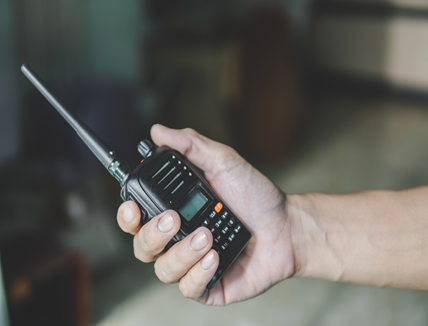
Effective communication forms the backbone of operational success in every business. Among the myriad of tools at the disposal of modern enterprises, mobile radios stand out for their unique capabilities and functionalities. However, like any technological tool, they come with their own set of limitations.
This article explores the multifaceted role of mobile radios in business operations, delving into both their advantages and limitations and providing insights into how they shape workplace communication.
Roles
- Enhanced Communication
Mobile radios have become an indispensable tool for immediate, direct communication in various business sectors. According to Sell Radios, mobile radios offer a streamlined way for team members to stay connected, especially in situations demanding rapid response and coordination.
For example, in construction sites, where timely and clear communication is critical for safety and efficiency, mobile radios enable workers to relay information instantly. Similarly, in event management or emergency services, the ability to communicate swiftly can be the difference between success and failure. This immediacy of communication is not just a matter of convenience but a vital component of operational effectiveness.
- Cost-Effectiveness
In terms of operational costs, mobile radios present a significant advantage over cell phones. They operate without the need for monthly service fees, making them a cost-effective choice for businesses focused on optimizing their communication expenses. This is particularly beneficial for small to medium-sized enterprises (SMEs) where budget constraints are a common challenge. By eliminating the recurring costs associated with cell phone plans, businesses can allocate resources more efficiently, enhancing their overall financial management.
- Reliability In Various Conditions
Reliability is another key aspect where mobile radios excel. Designed to function in less-than-ideal conditions, these radios are less likely to fail in areas with poor cellular reception or in harsh environmental conditions. This reliability is paramount in industries such as mining, forestry, and agriculture, where workers are often situated in remote locations. In these scenarios, mobile radios not only facilitate consistent communication but also ensure that help can be reached in emergency situations, thereby enhancing worker safety.
- Simplicity And Ease Of Use
The design of mobile radios emphasizes simplicity and ease of use. With features like one-button talk, users can communicate efficiently without the need to navigate through complex interfaces. This simplicity is crucial in high-pressure situations where every second counts. Unlike smartphones, which can be laden with distracting applications and features, mobile radios provide a straightforward communication tool that enhances focus and productivity.
- Group Communication Dynamics
A distinctive feature of mobile radios is their capability to facilitate group communication. Unlike cell phones, where individual calls need to be made to each person, radios enable one-to-many communication. This is especially beneficial in coordinating large teams where simultaneous information dissemination is necessary. In fields like logistics and transportation, this feature allows for efficient routing and timely updates, optimizing operational workflows.
- Safety And Emergency Use
In the realm of public safety and emergency services, mobile radios are not just a communication tool but a lifeline. They play a critical role in coordinating rescue operations, disaster management, and law enforcement activities. The robustness and reliability of mobile radios ensure that communication lines remain open even in the most challenging situations, thereby playing a crucial role in safeguarding lives and properties.
- Customizability And Scalability
Businesses often have unique communication needs that vary based on their size, nature of operations, and specific challenges. Mobile radios offer a level of customizability and scalability that can cater to these diverse requirements. From basic models for small teams to advanced systems with integrated features for large corporations, there is a wide range of options available. This versatility allows businesses to tailor their communication systems to their specific needs, ensuring that they have the right tools to grow and evolve.

Limitations
- Licensing And Regulatory Compliance
Another limitation is the need for licensing. In many countries, the use of certain frequencies and types of mobile radios requires compliance with regulatory standards and the acquisition of licenses. This process can be time-consuming and may involve additional costs, making it a potential barrier for some businesses.
- Feature Limitations
In comparison to modern smartphones, mobile radios lack several advanced features such as internet connectivity, cameras, and access to a wide range of applications. This limitation makes them less versatile than smartphones in certain contexts, particularly where multifunctionality is required.
- Interference And Channel Overcrowding
Interference and channel overcrowding can be a significant issue in areas with a high density of radio users. This can lead to communication disruptions, which can be particularly problematic in critical operations where clear and uninterrupted communication is essential.
- Learning Curve
For individuals accustomed to smartphones, there can be a learning curve in adapting to mobile radios. Understanding the functionality and best practices for radio communication can require training and time, which might be a consideration for businesses implementing these devices.
- Maintenance And Durability
Although designed to be robust, mobile radios require maintenance and are susceptible to wear and tear, especially when used in harsh environments. Regular maintenance is necessary to ensure their longevity and reliability.
- Privacy Concerns
Finally, the lack of privacy in communication is a noteworthy limitation of mobile radios. Since conversations typically occur on shared channels, sensitive information can be overheard by unintended listeners, posing a challenge in situations where confidentiality is crucial.
Wrapping Up
Mobile radios are a vital tool in the arsenal of modern business communication, offering a blend of reliability, cost-effectiveness, and ease of use. They are particularly valuable in industries where immediate, group-based communication is essential.
However, their limitations, including range restrictions, licensing requirements, and limited features, must be considered. By understanding both the roles and limitations of mobile radios, businesses can make informed decisions on integrating these devices into their operations, ensuring that their communication systems are both effective and efficient.


















